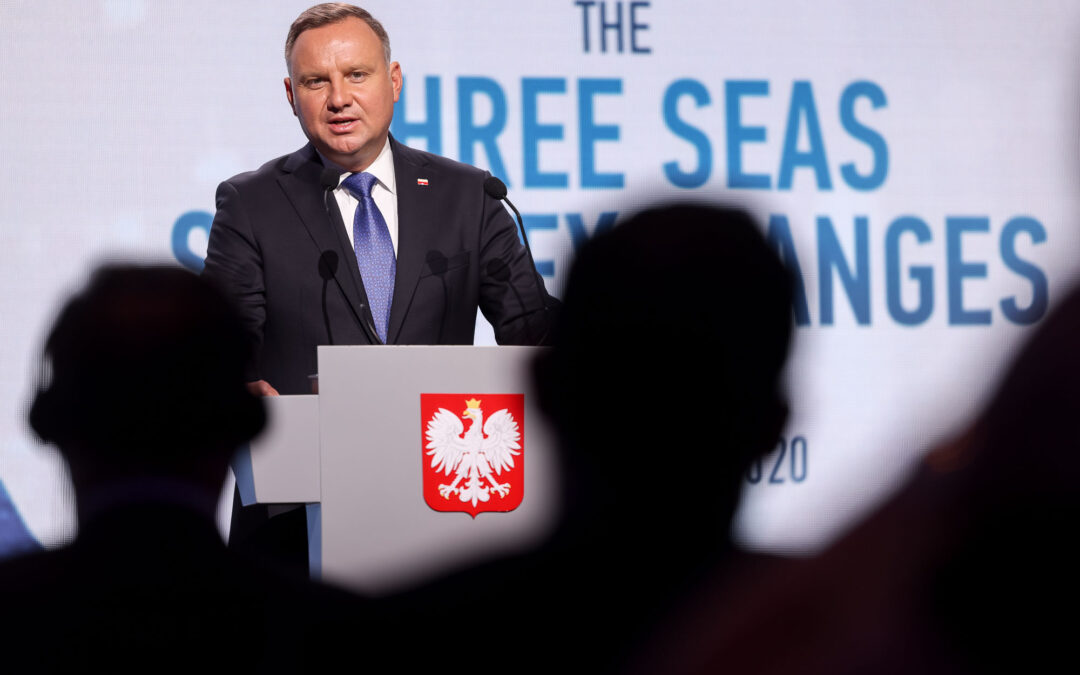Poland is currently the strongest it has been since the 17th century, says Andrzej Duda. The Polish president also hailed the economic potential of Central and Eastern European (CEE) countries if they can work together.
Duda was speaking at a meeting of the Three Seas Initiative (TSI), a forum that brings together 12 of the European Union’s eastern members. The countries are located in the triangle between the Baltic, Black and Adriatic Seas – from Estonia in the north to Bulgaria in the south.
The #ThreeSeas Initiative is designed to promote cooperation between 12 EU Member States and their partners.
Do you know who are the members of the initiative?
You will find them between the Baltic, Black and Adriatic seas: 🇦🇹, 🇧🇬, 🇭🇷, 🇨🇿, 🇪🇪, 🇭🇺, 🇱🇻, 🇱🇹, 🇵🇱, 🇷🇴, 🇸🇰 and 🇸🇮. pic.twitter.com/7hiEZCnGCy— Three Seas Summit and Business Forum (@3seaseu) August 25, 2020
Noting that the meeting was being held in Kraków, Duda said that the time when the city served as Poland’s capital, up until 1596, “was one of the best periods in the history of our country, or maybe even the best”.
“It was a time when we did not fight one another in this north-south space [in CEE]; we traditionally fought wars in other directions,” said Duda, quoted by 300Polityka. “I would like us to continue and develop the cooperation that then existed between Poland, Hungary and Lithuania.”
“I think we have great prospects [to achieve] this in these happy, peaceful times, when we have been living in free, independent, sovereign states for over 30 years,” the president continued. “The last time Poland had as much strength as today was in the 17th century, and it is our great task to take advantage of this opportunity.”
From the 16th to the 18th century, the Kingdom of Poland and Grand Duchy of Lithuania formed a single commonwealth that, at the time, was one of the largest and most populous states in Europe. The period up to the mid-17th century in particular is regarded as a golden age of Polish history.
Map of the Polish-Lithuanian Commonwealth at its height. http://t.co/YoUcyj20hn pic.twitter.com/9o6c14CkkS
— OnlMaps (@onlmaps) August 29, 2015
During his address, President Duda also argued that more recent history can also unite the countries of the CEE region, which suffered the devastation of World War Two and then fell under the dominance of the Soviet Union.
“We experienced similar difficulties, especially in the 20th century, and are therefore able to understand each other better than our colleagues from Western Europe, who never experienced communism, restrictions of free speech, not being allowed to travel, being under surveillance,” said Duda.
The president hailed the opportunities now presented by the Three Seas Initiative, a project that was launched in 2015 by Duda himself alongside his Croatian counterpart at the time, Kolinda Grabar-Kitarović.
It aims to build stronger links – especially economic ones – between the 12 states involved. Last year, a Three Seas Investment Fund was established to support the expansion of transport, energy and digital infrastructure in the region.
The project has received backing from the US administration. In 2017, during a visit to Warsaw, President Donald Trump attended a TSI summit and promised support for the initiative. In February this year, the US pledged $1 billion for the TSI’s investment fund.
The Trump has also forged a close relationship with Warsaw directly. This has included promises to boost the US military presence in Poland, ending visa requirements for Poles visiting the US, and cooperating on energy.
At @MunSecConf @SecPompeo announces that the US plans to support the Three Seas Fund for Central Europe with a sum of $1 billion. The money will go into energy infrastructure. What was not said is that it will happen if all 12 members committ financially to the fund #MSC2020 pic.twitter.com/WbiJh1pDyq
— Prof. Katarzyna PISARSKA (@KPisarska) February 15, 2020
At this week’s summit in Kraków, Duda noted that the TSI countries cover one third of EU territory and one quarter of the bloc’s population. Yet they represent “only 10% of the [EU’s] capital, which is still too little but, at the same time, a great prospect” for further development.
Promoting economic cooperation would not only “build the prosperity of our countries”, but also “of the whole European Union”, said Duda.
“The Three Seas initiatives are turning Central and Eastern Europe into Europe’s economic engine,” claimed Marek Dietl, CEO of the Warsaw Stock Exchange, at the event, which brought together heads of stock exchanges from TSI countries.
Dietl argued that, while the coronavirus pandemic had caused an economic “shock”, it also “opens new opportunities for the economies of the region”.
Next month, Estonia will host a virtual meeting of the TSI heads of state, focusing on the future of the initiative, funding of cross-border infrastructure projects and the digitisation of the energy and transport.
Main image credit: Jakub Szymczuk/KRPR/Prezydent.pl

Daniel Tilles is editor-in-chief of Notes from Poland. He has written on Polish affairs for a wide range of publications, including Foreign Policy, POLITICO Europe, EUobserver and Dziennik Gazeta Prawna.




















